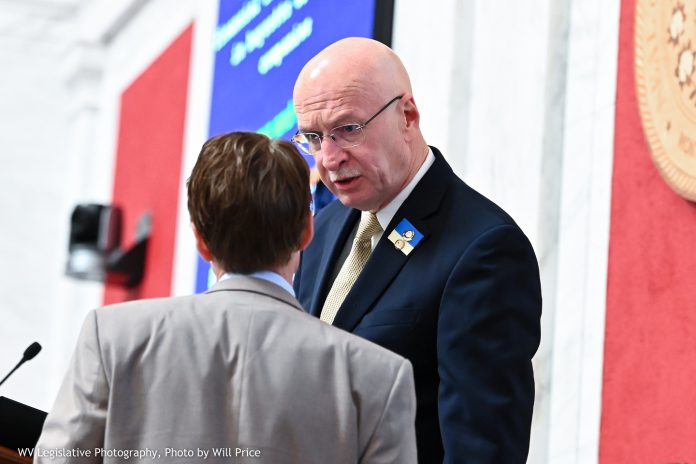The 2nd Session of the 85th Legislature concluded on March 12, 2022.
Here’s a glimpse of the 60-day session:
- 150 House Bills Completed
- 134 Senate Bills Completed
- 293 Total Bills
- 172 Resolutions Adopted by both the Senate and House
- 280 Bills signed by Governor
- 6 Bills became law without signature
- 5 bills have been vetoed: SB 573, SB 729, HB 2300, HB 4001, and HB 4020
For a PDF List of Completed bills, please see: 2022 Legislative Session At A Glance.
Highlighted Bills
Senate Bill 250 contains the state budget, which sets the general revenue budget for the fiscal year 2023 beginning in July at roughly $4.635 billion.
The bill includes additional pay raises for the West Virginia State Police, a plan by the governor to increase pay for Child Protection Service employees, and a freeze in regional jail per diem fees.
The budget also includes a 5 percent average pay raise for state employees paid from the general revenue fund.
The budget also provides additional funding for West Virginia University and reinstates a film tax subsidy, which had previously been suspended. The film tax subsidy will receive $10 million in funding, which is double what the fund had in previous years.
About 44 percent of the budget will be spent on public education, 26 percent will be spent on social services and 10 percent will go to higher education.
The budget includes 18 items in the back of the bill that would be funded with available surplus tax revenue at the end of the current fiscal year. The surplus appropriations total $1.058 billion. The budget also includes more than $1 billion in spending authority across state agencies using available federal COVID-19 funds.
Governor Justice vetoed a line of the budget that would have transferred $265 million worth of surplus funding from the Department of Revenue to the general revenue fund in anticipation of future income tax reductions. The governor said in a letter explaining his veto that there is no reason to set aside surplus revenue to an agency without any general law purpose. He said the general revenue fund does not need the additional money because the legislature never passed the proposed income tax reduction.
Senate Bill 463 establishes the Best Interest of the Child Protection Act of 2022. The bill will have deliberations in family courts begin with a presumption of fifty-fifty custody, analyze whether that is feasible, and, if it’s not, layout why not.
The bill notes that actions in the court system may reveal that equal joint custody is not actually in the best interest of the child. One exception would be cases where the mother and father have consensually reached an agreement on allocation of parenting time — or if one of the parties does not request sole, primary, or joint custody.
Additional exceptions would occur if one of the parents has committed an act of domestic violence against the other or if one of the parties is a sex offender.
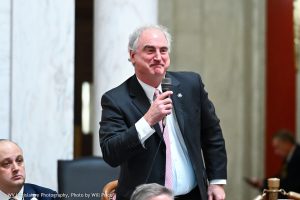 Senate Bill 694 deals with the property rights of surface owners and farmers as it relates to drilling for natural gas and horizontal wells, which can involve multiple property owners.
Senate Bill 694 deals with the property rights of surface owners and farmers as it relates to drilling for natural gas and horizontal wells, which can involve multiple property owners.
The bill sets new application requirements for the combination of the tracts for oil and natural gas drilling by operators of horizontal well units. It requires horizontal well units — consisting of two or more tracts — to get agreements from the mineral rights owners for at least 75 percent of the net acreage when it comes to interest from the royalties collected.
The legislation caps horizontal well units at 640 acres per unit, but a unit cannot contain more than 128 net acres controlled by non-consenting royalty owners. The bill gives non-consenting royalty owners with valid leases but lacking utilization provisions options for how they wish to be paid: either 25 percent of the weighted average bonuses or 80 percent of the average royalty rate percentage.
Non-consenting owners without valid leases can either sell their minerals, participate in the well subject to a 200 percent payout penalty, or elect to receive royalty payments in three different ways. They could choose to receive 100 percent of the weighted average bonus received by owners inside the unit within the previous 24 months, the highest royalty rate received by the owners in the unit within 24 months, or mineral owners could be paid through a weighted average sales price or the local monthly index price.
Completed Bills
Senate Bill 1 establishes a mining mutual insurance company. Proponents of the bill say the legislation is needed to ensure financial stability for the state’s mining industry by assuring that West Virginia doesn’t get caught with hundreds of millions of dollars in mine reclamation liability in an era of turbulent energy markets.
Currently, West Virginia is subject to federal requirements to have enough money available to complete reclamation for any areas where permit holders default.
Right now, the state’s Special Reclamation Fund is set up to cover any shortfall, but the worry is that could become overwhelmed by obligations.
West Virginia allows mining companies to post bonds of $1,000 to $5,000 an acre, amounts that the Department of Environmental Protection estimates would cover only about 10 percent of reclamation costs. West Virginia fills the gap with Special Reclamation Funds, which are funded primarily by a 27.9 cent tax levied on every short ton of coal produced
Increased reclamation costs combined with economic strain on the coal industry have highlighted the possibility of a financial crisis.
The legislation, which kick starts the company with $50 million in seed money, specifies that it will not be considered a department or agency of the state — but instead will be a company governed by five directors. The chairman, though, is to be appointed by the governor, and the remaining members will also be named by state officials.
Senate Bill 4 lifts a 26-year moratorium on the construction of nuclear power facilities in West Virginia.
Senate Bill 6 establishes that the intent and policy of the Legislature is that common law corporate “veil piercing” claims may not be used to impose personal liability on a member or manager of a limited liability company.
Senate Bill 8 makes technical changes to the state’s savings and investment programs.
Senate Bill 25 updates provisions of the Medical Professional Liability Act to clarify that a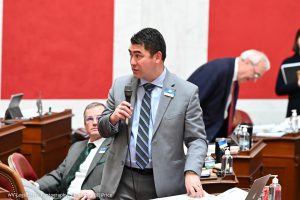 health care provider who executes a screening certificate of merit shall be subject to deposition and that the certain time frames applicable to most health care providers shall be the same for a nursing home, assisted living facility, and their related entities.
health care provider who executes a screening certificate of merit shall be subject to deposition and that the certain time frames applicable to most health care providers shall be the same for a nursing home, assisted living facility, and their related entities.
Senate Bill 135 relates to the acquisition and disposition of property by urban development authority.
Senate Bill 138 modifies the composition of the Board of Medicine by reducing the membership by one member. In conformity with the proportionality principles, one podiatric physician member is eliminated.
Senate Bill 172 raises the compensation of elected county officials.
Senate Bill 181 creates the Core Behavioral Health Crisis Services System. The legislation supports the expansion of mental health and suicide prevention services throughout the state, as initially established by the National Suicide Hotline Designation Act of 2020.
To handle the significant rise in calls for assistance, the National Suicide Hotline Designation Act 2020 was enacted by the U.S. Congress, naming 988 as the universal number to reach the mental health crisis hotline system. 988 will become active in July 2022 to aid in suicide crises or for anyone experiencing mental distress.
The bill will make the federally enacted universal number easier to access for state residents by creating hotline centers, funding for the service, and aid for those referred to long-term care.
Senate Bill 191 allows poll workers to work full and half days. In the past, poll workers have been required to work the entire 12 to 15-hour day.
Senate Bill 205 increases the number of PEIA board members from 8 to 10, adding one member representing hospitals and another representing small businesses.
Senate Bill 213 establishes the licensed professional counseling compact. West Virginia has become the fifth of 10 states needed to enact the Counseling Compact allowing professional counselors licensed and residing in a compact member state to practice in other compact member states without the need for multiple licenses.
Funded and created by the American Counseling Association, the Counseling Compact was finalized in December 2020 and has now been passed by the legislatures in Georgia, Maryland, Alabama, Mississippi, and West Virginia.
Senate Bill 221 establishes the occupational therapy compact. West Virginia has become the 11th of 10 states needed to enact the OTC, allowing professional occupational therapists licensed and residing in a compact member state to practice in other compact member states without the need for multiple licenses.
Now that more than 10 states have passed the OTC, member states can begin work to establish the interstate commission and officially convene the first meeting to draft the rules and bylaws of the Compact. Once the commissioners agree upon rules and establish a method by which Compact member states can share information, states will be able to grant Compact licenses, and individuals residing in those states will be able to take advantage of the benefits the Compact offers.
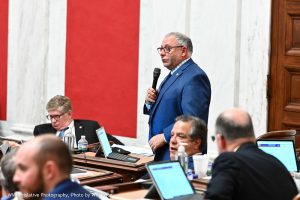 Senate Bill 228 gives free tuition to students who complete a certain amount of service hours in West Virginia as part of “an AmeriCorps State, National, VISTA or Senior Corps program.
Senate Bill 228 gives free tuition to students who complete a certain amount of service hours in West Virginia as part of “an AmeriCorps State, National, VISTA or Senior Corps program.
They would earn one free semester of undergraduate or graduate tuition for providing 600 hours of service or two free semesters for providing 1200 hours.
Once enrolled, students could continue providing service hours for free tuition for up to eight semesters.
Senate Bill 231 defines terms relating to broadband connectivity, requires engineering reports on available telecommunication cable space, provides for shared costs for the report, requires notice from pole owner or manager to telecommunication carriers of available space, and requires notice to pole owner or manager of intent to use any available space.
Senate Bill 232 amends the computation of time between imprisonment for a second felony offense and a third such offense when a sentence of life imprisonment may not be considered for the commission of the third felony.
Senate Bill 242 limits the authority of counties and municipalities to prevent or limit an owner’s complete use of natural resources or real property for farm or agricultural operations.
Senate Bill 244 corrects a one-word typo in the law that establishes the Intermediate Court of Appeals.
Senate Bill 245 enacts several changes to the state’s wage payment provisions using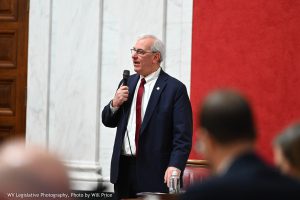 payroll cards.
payroll cards.
Under the bill, the employer may unilaterally elect to pay employee wages via payroll card, provided the employer discloses in writing any applicable fees associated with the payroll card.
In addition, the employee must have the ability to make at least one withdrawal or transfer from the payroll card per pay period without cost or fee, for any amount up to the amount contained on the card and must be able to make unlimited in-network withdrawals or transfers from the payroll card without any cost or fee, for any amount up to the amount contained on the card. Finally, employers who use payroll cards must give employees the option of being paid by electronic transfer (i.e., direct deposit) instead.
Senate Bill 246 requires water bottle filling stations in every new or renovated public school. Schools will have to have at least one filling station for every 200 occupants. The filling stations will be touchless and could be integrated into current water fountains.
Senate Bill 247 focuses on Certified Community Behavioral Health Clinics (CCBHCs) and joins West Virginia with 42 other states in adopting this model of treatment which provides comprehensive mental health and substance use services to any person in crisis.
Senate Bill 253 relates to adjustments to voting precincts following the recently completed redistricting process.
Senate Bill 261 requires more frequent viewing of the video from cameras that have been required in special education classrooms for the last few years. A school administrator is now required to review the video for no less than 15 minutes, no less than every 90 days. The school system is also allowed to release classroom videos to investigators and attorneys representing students and their families.
Senate Bill 262 authorizes the State Treasurer’s Office to restrict state banking contracts with any bank or investment group that refuses to deal with coal or natural gas companies or terminates contracts with existing fossil fuel companies as a way to punish the companies for engaging in extractive industries.
The State Treasurer’s Office would be required to maintain a public list of restricted financial institutions. Any bank on the restricted list would be unable to enter into new banking contracts with the State Treasurer’s Office or remain in current contracts. Financial institutions that can show they are not or no longer engaged in energy company boycotts would be removed from the list.
The bill applies to any bank, banking association, investment house, savings and loan, credit union, or savings bank where the State Treasurer’s Office might decide to deposit state taxpayer funds.
Senate Bill 264 makes minor changes to state conservation district law.
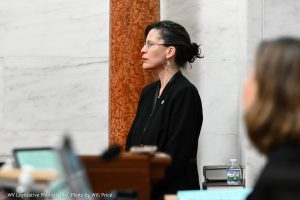 Senate Bill 268 allows “microschools” and “learning pods” of unlimited size. These would be lightly regulated schools or groups of students that could combine concepts from homeschooling, private schooling, and online schooling.
Senate Bill 268 allows “microschools” and “learning pods” of unlimited size. These would be lightly regulated schools or groups of students that could combine concepts from homeschooling, private schooling, and online schooling.
A learning pod is defined in the bill as “a voluntary association of parents choosing to group their children together” for Pre-K through 12th-grade school as an alternative to other types of schooling.
A microschool is defined in the bill as “a school initiated by one or more teachers, or an entity created to operate a school that charges tuition.”
Senate Bill 274 requires the secretary of DHHR to allocate CPS workers in counties according to the population based on the 2020 census and also requires the secretary of the DHHR to report the allotted CPS workers by the Bureau of Social Services district annually.
Senate Bill 279 authorizes the Department of Environmental Protection to promulgate a legislative rule relating to Ambient Air Quality Standards.
Senate Bill 312 authorizes the Alcohol Beverage Control Commission to promulgate a legislative rule relating to Private Club Licensing.
Senate Bill 330 authorizes the Division of Motor Vehicles to promulgate a legislative rule relating to the Examination and Issuance of a Driver’s License.
Senate Bill 334 authorizes the Department of Agriculture to promulgate a legislative rule relating to Feeding of Untreated Garbage to Swine.
Senate Bill 419 establishes a pilot project to evaluate the impact of certain post-substance use disorder residential treatments.
Senate Bill 424, the 2022 Farm Bill, provides additional powers to the Commissioner of Agriculture to collect certain debts. The bill establishes West Virginia Animal Remedy Law, defines agritourism as agriculture, and amends the Auctioneer Board of Review.
Senate Bill 427 allows WV Board of Medicine investigators to carry a concealed weapon.
Senate Bill 434 modernizes the powers of authorities given to airports to better reflect current operations. The bill updates certain terms and definitions and adds the term “international airport” and “vertiport” to certain areas of the code. The bill increases the cost of violations for pedestrian traffic near airports. Finally, the bill clarifies airport police jurisdiction.
Senate Bill 435 allows for the award of the service weapon to a retiree from the Division of Protective Services.
Senate Bill 436 corrects a code citation for the authority of the State Fire Marshal.
Senate Bill 437 allows the Chairperson of the Parole Board to release a parolee early, and after serving a minimum of one year on parole, following a request from the Commissioner of the Division of Corrections and Rehabilitation, or designee, and upon a review of the request and submission by the Commissioner, or designee.
Senate Bill 438 establishes the West Virginia Security for Public Deposits Act.
Senate Bill 440 establishes the Uniform Commercial Real Estate Receivership Act
Senate Bill 441 makes confidential, any video, incident reports, or other records related to the management of inmates or juveniles at any correctional or juvenile facility. It includes exceptions for viewing the material for the commissioner of corrections, law enforcement, or attorneys when investigating claims.
Disclosure to view the material could also happen via a court order when necessary to protect the orderly operation of the correctional facility or to protect people from harm.
Senate Bill 443 includes police and firefighter as electors of trustees for certain pension funds.
Senate Bill 445 modifies police and firemen’s pension plans for trustees
Senate Bill 448 develops policies and procedures for the Statewide Interoperability Executive Committee.
Senate Bill 449 clarifies that the Nonviolent Offense Parole Program is not available to offenders who are serving a sentence that runs concurrently or consecutively with an excludable offense and to further clarify that the program is not available to an offender who has been released under the program on a previous occasion.
Senate Bill 450 updates definitions of the West Virginia Personal Income Tax Act
Senate Bill 451 updates definitions of the West Virginia Corporation Net Income Tax Act.
Senate Bill 452 allows civil remedies and actions for the unauthorized disclosure of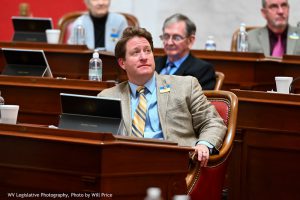 intimate images. The bill also provides for the plaintiff’s privacy and creates a statute of limitations.
intimate images. The bill also provides for the plaintiff’s privacy and creates a statute of limitations.
Senate Bill 466 prohibits any inmate housed in a correctional facility in West Virginia from bringing a civil action when that inmate has had three previous civil actions dismissed on grounds the action was frivolous, malicious, or failed to state a claim upon which relief may be granted. Inmates bringing civil actions alleging they are under imminent danger of serious physical harm are not prohibited from bringing suit under this statute but must state the allegations specifically.
Senate Bill 468 prohibits licensed medical professionals from performing an abortion if it’s because of a disability unless there is a medical emergency or a non-medically viable fetus. Medical providers who violate the policy would be subject to discipline from licensure boards.
Senate Bill 470 removes the persistent vegetative state from the living will and combined medical power of attorney and living will, renames the physician orders for scope of treatment as the portable orders for scope of treatment, and indicate that an advanced practice registered nurse and a physician’s assistant may complete one within their scope of practice, and to provide reciprocity for the portable orders for scope of treatment or similar medical orders validly executed in another state.
Senate Bill 476 corrects cross-references that exempt thin seam coal from the minimum severance tax.
Senate Bill 478 provides a sunset provision regarding the public reporting of those claiming the Neighborhood Investment Tax Credit.
Senate Bill 487 combines the totals of the Revenue Shortfall Reserve Fund and Revenue Shortfall Reserve Fund – Part B when determining surplus deposit eligibility. It also limits the amount of surplus deposited into the Revenue Shortfall Reserve Fund.
Senate Bill 492 provides for the electronic collection of tolls.
Senate Bill 499 authorizes legislative rules for the School Building Authority.
Senate Bill 505 updates the law related to money transmitters to align West Virginia with the majority of states with respect to control of a licensee and key individuals as well as net worth. The bill will also allow West Virginia to participate in and accept multistate examinations as well as application information and decisions to reduce the regulatory burden on licensees.
Senate Bill 508 includes muzzleloader hunting of deer in the requirement for daylight fluorescent orange for hunters.
Senate Bill 515 supplements and amends appropriations of public moneys to the Department of Administration and Public Defender Services.
Senate Bill 517 expires funds from the unappropriated balance in the State Excess Lottery Revenue Fund.
Senate Bill 518 allows for nurses licensed in another state to practice in the State of West Virginia upon registration with the West Virginia Board of Examiners for Registered Professional Nurses.
Senate Bill 520 increases the financial penalties regarding any person who, knowingly and willfully, directly or indirectly, accesses or causes to be accessed any computer, computer services, or computer network for purposes of executing any scheme to defraud or obtaining money, property, or services using fraudulent pretenses, representations, or promises and increases the financial penalties in regard to any person who, with intent to extort money or other consideration from another, that introduces ransomware into any computer, computer system or computer network, and provides a mechanism for restitution to the state, state agencies, and political subdivisions for damages caused by ransomware attacks.
Senate Bill 522 combines the offices of the State of West Virginia Equal Employment Opportunity Office and the Americans with Disabilities Act Office to more efficiently serve the citizens of the State of West Virginia.
Senate Bill 523 transfers oversight of the Jobs Investment Trust Fund to the West Virginia Economic Development Authority.
Senate Bill 524 streamlines the operations of two agencies by reorganizing their duties and functions under the Department of Arts, Culture, and History and creates a state library section in the Department of Arts, Culture, and History. The legislation also creates the National Coal Heritage Area Commission.
Senate Bill 525 expires funds from the unappropriated balance in Lottery Net Profits.
Senate Bill 526 supplements and amends appropriations to the Department of Commerce.
Senate Bill 527 supplements and amends appropriations to the Department of Administration, Office of Technology.
Senate Bill 528 supplements and amends appropriations to the DHHR, Consolidated Medical Services Fund
Senate Bill 529 encourages additional computer science education in West Virginia schools.
Senate Bill 530 encourages the use of public-private partnerships by cleaning up antiquated provisions of the public-private partnership statute and simplifying the process to make it more effective and particularly encourages the use of public-private partnerships in the construction of highways in the state.
Construction of highways using public-private partnerships is encouraged by allowing money collected from only the state portion of a coal severance tax on projects where construction would result in the extraction of coal incident to the construction, would be paid to each participant in a public-private partnership upon the determination of satisfactory completion of the project.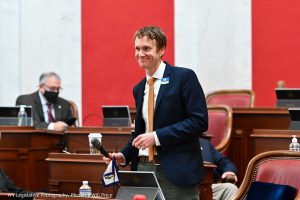
Senate Bill 531 provides a pay increase for state troopers, teachers, and school service personnel.
The legislation provides an average 5 percent salary increase for employees and troopers with the West Virginia State Police, public school teachers, professional student support personnel, and school service personnel starting July 1.
Senate Bill 533 eliminates the soda tax and replaces support for WVU Health Sciences through the insurance premium tax. The bill secures $14 million in revenue for the WVU medical, nursing, and dental programs; secures $5.5 million for Marshall University’s School of Medicine; and $3.9 million for the West Virginia School of Osteopathic Medicine.
Senate Bill 535 allows for revocation of certain school personnel licenses and certifications upon conviction of certain crimes or a finding of abuse by the West Virginia Department of Health and Human Resources.
Senate Bill 536 clarifies statutes on possessing, manufacturing, importing, and transporting fentanyl in West Virginia.
Senate Bill 537 provides additional firefighters and security guards for the National Guard. The legislation allows firefighters and security guards to continue service until age 62 and permit the use of civilian personnel in the event of deployment or mobilization.
Senate Bill 542 transfers the Broadband Enhancement Council from the Department of Commerce to the Department of Economic Development
Senate Bill 546 allows an institution of higher education to pledge a portion of its tuition and fee revenue toward debt service and would add IT projects to the list of capital projects that an institution of higher education could issue debt for.
Senate Bill 548 authorizes Workforce West Virginia employers to obtain employment classifications and work locations.
Senate Bill 552, the Community Resurrection and Economic Development Act is intended to help cities and counties deal with dilapidated buildings.
The legislation changes how the Land Bank is operated in West Virginia and will set aside $30 million to help cities and counties demolish unsavable buildings.
The first goal of the bill addresses properties that can be saved and incentivizes ownership and repurposing of abandoned lands. The bill offers a hardship plan to property owners to allow for repayment arrangements or tax forgiveness when one or more conditions are met.
If the taxes are delinquent and the property ends up in the Auditor’s Office, it will first be offered to owners of neighboring parcels of land, then the city or county in which it sits, then nonprofit corporations and charitable groups. The Auditor’s Office also is partnering with the state Housing Development fund to identify select properties to entice teachers, doctors, and other essential workers to certain areas in the state, and to help people who have completed drug recovery rebuild their lives.
The second component of the bill would aid communities to demolish dilapidated structures with the $30 million set aside.
Other highlights of the bill include a statewide uniform process for collection and enforcement of property taxes, changing how interest and penalties for redeemed taxes are calculated, shortening the time for redeeming delinquent taxes, and returning abandoned property to the books before it becomes uninhabitable.
Senate Bill 553 removes the power of the West Virginia Health Care Authority to adopt, amend, or repeal lawful policy guidelines and to require the authority, in cooperation with the DHHR secretary to file a legislative rule regarding the collection, retention, and use of Uniform Bill data.
The bill sets a fee for the request for custom data requests for Uniform Bill data. The legislation also requires the Secretary of the Department of Health and Human Resources to file a report with the Legislative Oversight Commission on Health and Human Resources regarding his or her assumption of the West Virginia Health Care Authority’s data repository powers and duties.
Senate Bill 568 permits a purchaser of insurance to evaluate how underwriting impacts their insurance costs.
Senate Bill 570 establishes training for law enforcement in handling individuals with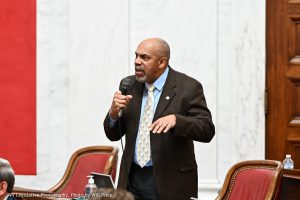 Alzheimer’s and dementia.
Alzheimer’s and dementia.
Senate Bill 571 declares certain claims to be moral obligations of the state.
Senate Bill 573 provides a system where magistrates preside, in certain instances, outside of normal court hours.
Senate Bill 575 ensures that imposition of certain sexual offenses applies to those people working in juvenile facilities against juveniles detained or committed in juvenile facilities.
Senate Bill 582 establishes an office within the Governor’s Office to coordinate workforce development, job training, education, and related programs and initiatives across agencies and entities to continue to grow West Virginia’s workforce and to provide greater options for West Virginians seeking work and West Virginia businesses seeking employees.
Senate Bill 584 increases the maximum loan balance for each congressional district from $4 million to $6 million and increases the cap relating to providing extensions to a water facility or wastewater facility from $1 million to $1.5 million.
Senate Bill 585 creates an administrative medicine license for physicians who do not seek to practice clinical medicine.
Senate Bill 591 clarifies that when a legislative district sits entirely inside a single county, the county party executive committee will draw up the list of nominees from which the Governor can select to fill the seat.
Under previous law, for districts that span two or more counties, the district executive committee would choose the nominees.
Senate Bill 593 permits the Marshall University Forensic Laboratory to be classified as a criminal justice agency to get access to the West Virginia DNA databases related to Missing Persons, Relatives of Missing Persons, and Unidentified Human Remains databases.
Senate Bill 595 amends the Dangerousness Assessment Review Board. The bill bars the subpoenaing of board members to testify in proceedings about which the board issues advice, guidance, or opinion. The bill also requires in place of testifying that the board provides copies of all documents and materials used in providing its advice, grievance, or opinion upon request of the circuit court.
Senate Bill 597 relates to the Public Service Commission underground facilities damage prevention and one-call system and amends several definitions relating to it.
Senate Bill 598 directs the Department of Veterans Affairs to establish partnerships with service organizations engaged with their local veteran communities to connect veterans and their families with existing resources to combat suicide, and its contributing factors, among the veteran population in West Virginia.
Senate Bill 603 bill prohibits medical licensure and re-licensure in WV if an applicant is prohibited from practicing in another jurisdiction.
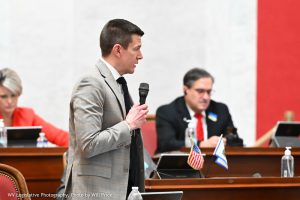 Senate Bill 606, the West Virginia Medical Practice Act, establishes a duty to report certain incidents of provider misconduct by persons authorized by the medical board to treat patients in West Virginia.
Senate Bill 606, the West Virginia Medical Practice Act, establishes a duty to report certain incidents of provider misconduct by persons authorized by the medical board to treat patients in West Virginia.
The bill provides civil immunity for good faith reports to the board and modifies the grounds for professional discipline and license denial to include a broader array of provider sexual misconduct.
Senate Bill 609 allows the Department of Highways Commissioner to accept ownership of rented and leased equipment.
Senate Bill 610 bill specifies the duties, authority, and responsibility of the Secretary of the Department of Transportation in much the same way the other department secretaries have been specified.
Senate Bill 611 removes the cap on bidders’ contract bonds and allows more flexibility when setting the bidder bond on projects.
Senate Bill 616 keeps court files and law-enforcement records regarding certain sexual offenses confidential unless the court should order otherwise.
Senate Bill 624 makes a supplementary appropriation to DHHR, Division of Health, Laboratory Services.
Senate Bill 625 makes a supplementary appropriation to the DHHR, Division of Health, Vital Statistics Account.
Senate Bill 626, supplements, amends, and increases existing items of appropriation from the State Road Fund to the Division of Transportation and the Division of Motor Vehicles.
Senate Bill 627, supplements, amends, and increases existing items of appropriation from the State Road Fund to the Division of Transportation and the Division of Highways.
Senate Bill 628 supplements and amends appropriations to the Department of Commerce and the Division of Natural Resources.
Senate Bill 629 supplements and amends appropriations to the Department of Education and the West Virginia Board of Education, Vocational Division.
Senate Bill 630 supplements and amends appropriations to the Higher Education Policy Commission, Administration – Control Account.
Senate Bill 633 supplements and amends appropriations to DHHR, Consolidated Medical Services Fund.
Senate Bill 634 makes supplemental appropriations to DHHR, Division of Health – Hospital Services Revenue Account Special Fund Capital Improvement, Renovation, and Operations.
Senate Bill 636 supplements and amends appropriations to the Department of Revenue, Office of Tax Appeals.
Senate Bill 637 supplements and amends appropriations to Executive, Governor’s Office – Civil Contingent Fund.
Senate Bill 638 changes the hearing and notice provisions for failing or distressed public utilities.
Senate Bill 639 provides a 45-day waiting period on rate increases when water and sewer services are purchased from a municipality.
Senate Bill 641 requires the Consolidated Public Retirement Board to set each county’s contributions to the Deputy Sheriff’s Retirement System.
Senate Bill 643 removes the residency requirement of members appointed to a county airport authority.
Senate Bill 647 is meant to protect people with mental or physical disabilities from being denied access to organ transplants solely due to their disability. While this is already banned at a federal level due to the Americans with Disabilities Act, state-specific legislation provides an even greater safeguard.
denied access to organ transplants solely due to their disability. While this is already banned at a federal level due to the Americans with Disabilities Act, state-specific legislation provides an even greater safeguard.
Senate Bill 650 eliminates the minimum number of royalty owners required to be considered for a gas drilling operation as one unit. Previously, the number was originally seven or more for the rules surrounding co-tenancy to kick in. Co-tenancy refers to the mineral rights applying to multiple owners. Operators still must control 75 percent of the acreage involved.
Senate Bill 656 incentivizes employers to create childcare facilities via a tax credit that would be received over several years. The bill would also allow a business to join other businesses in creating new childcare centers. The goal is to give employers a new option to help recruit and retain workers and to give employees of participating employers the benefit of having childcare close to their workplace.
Senate Bill 662 relates to the creation, expansion, and authority of resort area districts in West Virginia.
Senate Bill 686 clarifies the use of notes and bonds of the West Virginia Housing Development Fund.
Senate Bill 693 clarifies meeting voting requirements for political party executive committees.
Senate Bill 698 ensures Veterans’ Council membership contains representatives from varying regions of the state as well as varying service branches.
Senate Bill 704 allows parents, grandparents, and guardians to inspect instructional materials in students’ classrooms.
Senate Bill 713 removes the statutory limit for the Environmental Laboratory Certification Fund.
Senate Bill 714 relates to tied votes by the Coal Mine Safety and Technical Review Committee, clarifying that the Director of the Office of Health, Safety, and Training or his/her designee, is permitted to break the tie.
Senate Bill 715 adjusts existing items of appropriations from the State Fund, General Revenue.
Senate Bill 716 provides a supplemental appropriation to the Department of Education, West Virginia Board of Education, Strategic Staff Development Division.
Senate Bill 717 makes a supplemental appropriation to Miscellaneous Boards and Commissions, the Board of Medicine, and the Medical Licensing Board.
Senate Bill 718 makes a supplemental appropriation to the Department of Administration, Travel Management, Aviation Fund.
Senate Bill 719 makes a supplemental appropriation to the Division of Homeland Security, Fire Commission, and Fire Marshal Fees.
Senate Bill 720 supplements and amends appropriations to the Governor’s Civil Contingency Fund.
Senate Bill 722 expires funds to the Division of Environmental Protection, Reclamation of Abandoned and Dilapidated Property Program Fund.
Senate Bill 723 makes a supplementary appropriation to the Department of Agriculture, WV Spay Neuter Assistance Fund.
Senate Bill 724 makes a supplementary appropriation to the Division of Homeland Security, Division of Corrections and Rehabilitation, Regional Jail, and Correctional Facility Authority.
Senate Bill 725 supplements and amends appropriations to the West Virginia State Police.
Senate Bill 726 clarifies offenses for which pre-trial diversion is prohibited and clarifies offenses for which, under certain circumstances, the defendant is eligible for deferred prosecution.
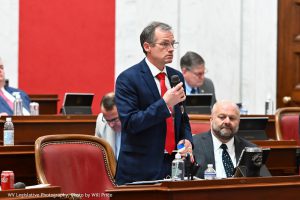 Senate Bill 729 creates a loan fund with the West Virginia Economic Development Authority. Governor Justice vetoed the bill over several technical errors, concluding the errors would have made it difficult or impossible to use the money appropriated to the Economic Development Authority consistent with the intent of the bill.
Senate Bill 729 creates a loan fund with the West Virginia Economic Development Authority. Governor Justice vetoed the bill over several technical errors, concluding the errors would have made it difficult or impossible to use the money appropriated to the Economic Development Authority consistent with the intent of the bill.
Senate Bill 731 makes a supplementary appropriation to the Department of Tourism, Tourism Workforce Development Fund.
Senate Bill 732 makes a supplementary appropriation to the Hospital Finance Authority, Hospital Finance Authority Fund.
Senate Bill 733 supplements and amends appropriations to the Governor’s Office.

